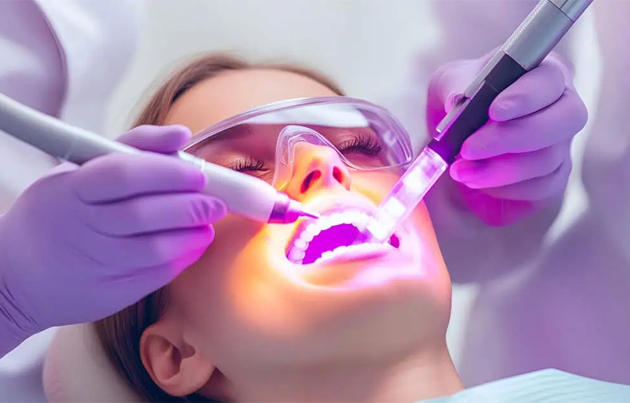
Laser Treatment In St. Louis, MO
Why Laser Dentistry?
- Ultra- precise
- Non-invasive
- Comfortable
Periodontal Disease Can Be Treated With The Help Of Laser Dentistry
Periodontal disease, often known as gum disease, is an infection of the tissues and bones that support the teeth. Gum disorders affect adults in their 30s and 40s for a variety of reasons, including poor dental health, hereditary susceptibility, chronic conditions including diabetes, smoking, and certain drugs.
Scaling and root planing is a common periodontal disease treatment (SRP). Cleaning the surfaces of teeth and their roots, which may be exposed owing to gum recession, is a non-invasive procedure.
Tissue preservation, regeneration, and bone-building are all benefits of laser treatment.
Advanced Laser Dentistry with Biolase Technology
- Shot-free fillings for a more comfortable experience
- Precision in crown procedures and gum tissue removal
- Faster recovery with less discomfort
- Laser whitening for a brighter smile with minimal sensitivity
- Soft tissue treatments for effective gum care
Whether you're in for a routine cleaning or more advanced care, our Biolase technology ensures more comfortable, efficient, and precise treatments. Experience the future of dental care with our advanced laser technology!
Other Benefits include:
- The Minimally Invasive Way
- No More Rubber Cups
- No More Brushes
- No More Paste
- Less Use Of Power And Hand Instrumentation
Advantages Of Laser Technology In Gum Treatment
- Gingivitis sufferers may experience significant gum bleeding and bone loss. As a result, removing bacteria from the teeth and gingival spaces is crucial. Lasers have the advantage of not only eliminating but also killing microorganisms. This aids in the reduction of gum bleeding and swelling. It may potentially eliminate the need for additional gum disease therapy like gum surgery.
- The wavelengths and power levels of the laser beam can be modified based on the severity of the periodontal disease. This provides dentists complete control over the procedure and enables them to provide dental treatment that is specifically tailored to each patient’s long-term needs.
- Laser treatment is gentle on the gums, teeth, and surrounding tissues. As a result, compared to typical surgery, the recovery period is considerably decreased. Patients will heal more quickly, and the entire process will speed up.
- Lasers are less intrusive and do not require drilling. This minimizes the amount of pressure that patients experience, implying that an anesthetic isn’t required. As a result, patients have reduced pain and discomfort. Patients will feel less worried and relaxed during therapy if they experience less discomfort.
- Since laser treatments are so precise, they may be used to keep the good parts of the teeth intact while eradicating cavities. Preserving any good teeth in individuals with severe bacterial infections would help to assure better long-term outcomes.
- Lasers help to sterilize the area you work in and reduce the risk of bacterial infections because they don’t require any equipment for an operation. Laser therapy can help patients achieve better clinical outcomes in less time, while also lowering discomfort and the need for more intrusive treatments. This treatment can be used in conjunction with regular operations or as a stand-alone procedure. This decision can be made based on the kind and severity of the periodontal disease.


